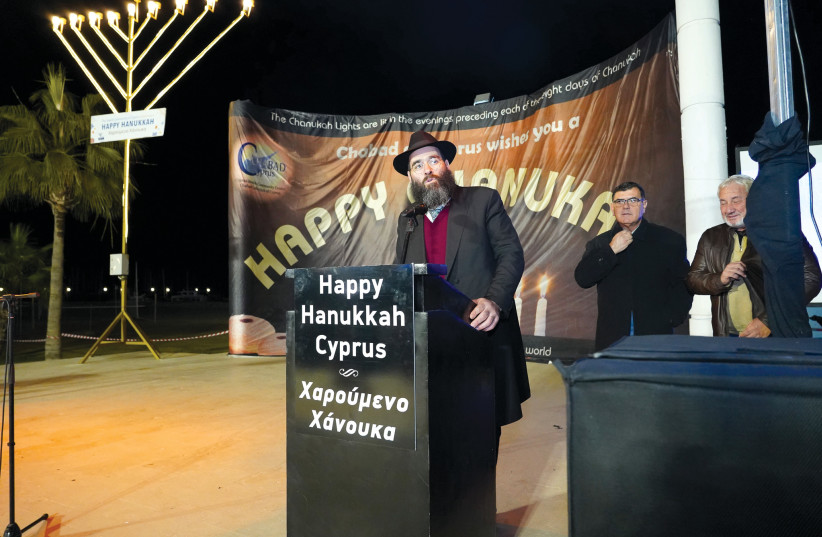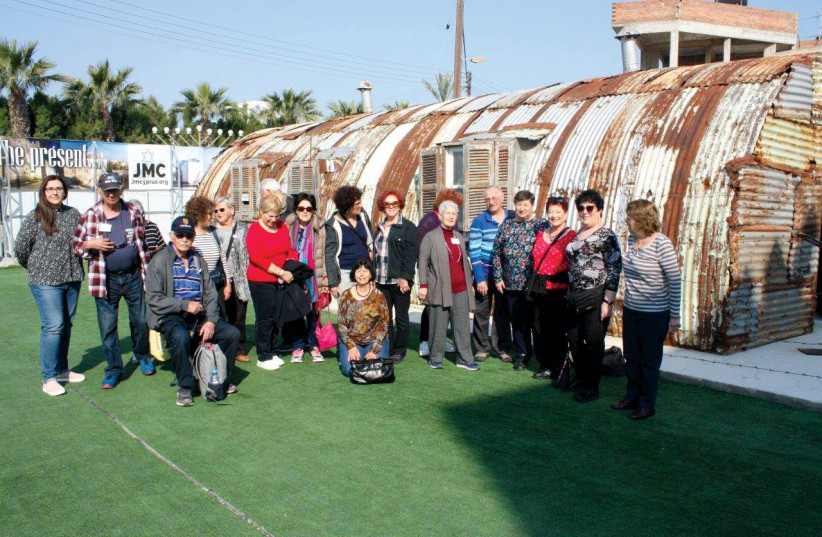The Jewish population in Cyprus has swelled over the past three years, so said the country’s chief rabbi, Arie Zeev Raskin, during a recent sit-down with In Jerusalem in his synagogue office in the port city of Larnaca.
“In total, the number of people coming from Israel has increased tremendously. A lot of the newcomers come because the life in Israel has become complicated for them, with too much stress. So people who can work from home have moved here.
“They find it is a nice, quiet destination that is close to Israel [flights from the coastal city of Paphos to Tel Aviv take 50 minutes]. The relationship between the two countries is very friendly.
“They think, ‘I can get a quiet life. I will pay half the price for rent – instead of having an apartment, I’ll have a villa with a swimming pool by the sea,’” he said.
“During COVID, when people got work-from-home orders, we saw an explosion of people move here from Israel. It was a bit like in America, when people went from New York to Miami. Of course, as Chabad, we are not happy with that. We believe that the Jewish people should remain in Israel.”
Arie Zeev Raskin
How did the pandemic play into this?
“During COVID, when people got work-from-home orders, we saw an explosion of people move here from Israel. It was a bit like in America, when people went from New York to Miami. Of course, as Chabad, we are not happy with that. We believe that the Jewish people should remain in Israel,” he stressed.
He estimates there are a total of 2,000 Jewish families in Cyprus – about 6,000 Jews live there.

There are Chabad houses, which also serve as the country’s synagogues, in Larnaca, Aya Napa, Paphos, Limassol and Nicosia.
“We are a bigger community now, but we’ve still got that warmth of a small community,” the rabbi adds. “So we’re trying to keep it intimate as much as we can, and deal with the challenges of growing at the same time.”
Instead of two rabbis for the whole community before COVID, there are now seven. They are also in the middle of constructing a museum in Larnaca, the base of the community, and opening a kindergarten there as well.
Rabbi Raskin adds that religious marriages from Israel are increasingly taking place in Cyprus. “It became a style where people don’t want to have a big crowd. You want to have all your family and some friends on holiday abroad.”
Why are there religious equality issues for Jews in Cyprus?
However, there are serious barriers to religious equality within Cyprus. The US Department of State report on religious freedoms in 2021 noted that all minority faiths (the state is under the Orthodox Church) faced big challenges in obtaining equality of religion. Specific to Jews, the report stated: “Representatives of the Jewish community continued to report that authorities performed autopsies on deceased members of the community for deaths that were not suspicious, a practice they said violated Jewish religious beliefs and practice. They stated that despite their continuing efforts to raise the issue with government authorities during the year, it remained unresolved.”
Raskin said: “It is beyond our understanding. In the UK, for example, MRI is allowed as an alternative to invasive autopsy. But even after presenting the local authorities with comprehensive information and having multiple correspondences and meetings, the issue was not resolved. Every time we have a case of a Jewish person dying in Cyprus, we have to find creative ways to prevent an autopsy from taking place.”
EVEN MORE existential to the functioning of the Jewish community is that Cypriot authorities continue to deny permission to perform shechita (ritual slaughter). In December 2020, the EU Court of Justice ruled that EU member states may impose a requirement to stun animals prior to slaughter and that such a requirement did not infringe on the rights of religious groups.
“The effect is that the local community needs to import kosher meat from other countries in Europe, which results in a price three times higher (and in some cases even more) than locally sourced kosher meat for poor quality products,” he stated. “Shechita is one of the core aspects of Jewish life. Historically, when antisemitic regimes wanted to reduce the Jewish population in their country, the first thing they did was to prohibit shechita.
“Although we are certain that this is not the intention of the current minister of agriculture or anyone in the Cypriot government, not having access to affordable kosher meat makes living as a Jew in Cyprus increasingly challenging. This is especially upsetting, since shechita is allowed in most developed EU countries and the professionals at the veterinarian service agree that the shechita method is as humane as conventional slaughter methods to list. We hope this issue will be resolved soon.”
The report also stated there was reportedly a physical attack against a 15-year-old Jewish student in Limassol by a group of Palestinian students. In other incidents, individuals who were attacked in public places wore kippot (skullcaps) or tzitzit (knotted ritual tassels). Authorities reported no arrests, according to Jewish community representatives.
Despite these incidents, Raskin noted that “the Cypriot people are very warm and respectful to the Jewish community, and local officials are meeting regularly with the Jewish community representatives to solve the said issues.”
JEWISH HISTORY in Cyprus goes back 3,500 years. Not too many people from the post-World War II community remain in Cyprus these days, due to emigration and intermarriage. However, the Jewish community is still welcoming to local Jews, including those in mixed marriages. Hanukkah is one of the best-attended events, where hundreds of people witness the public lighting of menorahs across the island.

The country’s most famous Jewish involvement was when Britain set up an internment camp on the island for 52,000 Holocaust survivors who arrived by boat in 1946 and stayed for two years. They had been trying to reach Palestine – deemed illegal by Britain at the time of the Mandate.
Connections are still very close. An Israeli woman who was a little girl in the camp returns to the island regularly. The local Cypriots were very kind to the Jews, helping to supply them with water, clothes and medical support. The courtyard of the Chabad in Larnaca displays a barrack which housed three families. It is austere, but people who had survived the Holocaust were able to cope with the conditions. When Israel gained independence in 1948, most left for there.
The island also famously boasts a huge tourism scene, with Israelis and European Jews coming regularly for weekend breaks.
A group of 40 Israelis were at the Blue Lagoon Kosher Hotel in Paphos over a mid-January Shabbat. The hotel is part of the Capital Coast Resort and Spa. Observant guests eat at their own kosher restaurant in the hotel. There is a synagogue and lounge facility, perfect for Shabbat. Families go in much larger numbers on Passover and Sukkot, when the entire hotel is kosher. The hotel, which is situated two miles from the old town in Paphos, it has beautiful views of the coast and direct access to the beach.
The facilities? The gym is rather basic, but the spa is excellent. It has an indoor pool, jacuzzi and sauna. The hotel is art deco, with a stunning pool area and a large swimming pool, ideal for families.
Local sites include the archaeological site of the Tombs of the Kings and banana plantations. Trips include the Aphrodite and Adonis Trail – the mythical nature trail which follows in the footsteps of the goddess Aphrodite. The route is labyrinthine and arduous, stretching a distance of 7.5 kilometers. Not open in the winter, the Latchi Blue Lagoon Boat Trips takes tourists to a beauty spot running from Latchi, a fishing village 40km from the Paphos Bay, all the way to Paphos.
Latchi itself has a new kosher hotel – the Caprice Kosher Spa Resort. For access to attractions, it is arguably better positioned than Paphos. However, it is 45 minutes farther away from Paphos Airport. ❖
The writer was a guest of the Blue Lagoon Kosher Hotel.
